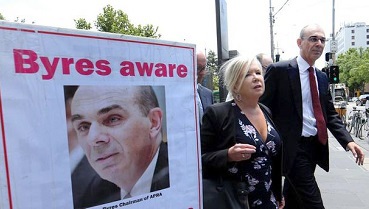The Australian Alert Service is the weekly publication of the Australian Citizens Party.
It will keep you updated on strategic events both in Australia, and worldwide, as well as the organising activities of the Citizens Party.
To subscribe to the Australian Alert Service, it's easy, and it's secure.
Lead Editorial
11 August 2021
Vol. 23 No. 32
A Freedom of Information (FOI) request has revealed that bank regulator the Australian Prudential Regulation Authority (APRA) was concerned back in April about a rapid expansion of mortgage lending, and warned banks that in the current environment they must be “especially vigilant in managing the risks within their residential mortgage portfolios”.
In a letter to the banks reported by the Australian on 8 August, APRA head Wayne Byres said the backdrop for the expansion of lending was “extraordinarily low interest rates, high household indebtedness and accelerating housing prices”.
“Given the importance of mortgage lending to the balance sheet of the banking system, it is important for the resilience of the system that standards for new lending remain prudent and responsive to changing market conditions”, the letter continued. (Emphasis added.) Mortgages represent over 63 per cent of bank lending.
“APRA expects (banks), and particularly the largest lenders, to be especially vigilant in managing the risks within their residential mortgage portfolios in the current environment.
“APRA would not expect to see (a bank) relax its risk appetite limits at this time”, Byres said.
The Australian reported that housing finance commitments have risen 83 per cent in the past year, and investor lending has increased 40 per cent since January. Prices are going up at the fastest rate in over 17 years—i.e. since before the 2008 global financial crash. Principal of Digital Finance Analytics, Martin North, has reported that his data shows a significant deterioration in lending standards over the last few months, with the average first-time buyer securing loans 15 per cent bigger than last year. RBA monetary easing and political efforts to wind back responsible lending laws are driving a new speculative binge, increasing profit margins for the big end of town, but spelling doom for the population.
At the same time he was quietly warning banks on risk, publicly Byres was insisting there was no problem, fitting in with the broader push to blame responsible lending laws for hampering economic recovery. From late 2019 PM Scott Morrison and Treasurer Josh Frydenberg were begging the banks to ignore sound lending standards and beef up lending. Speaking at a Senate Estimates hearing in June 2021, Byres downplayed any threat from the boom in housing credit, including higher-risk lending, or any need for regulatory intervention.
During the Financial Services Royal Commission, in July 2018, Byres had insisted financial markets must be governed by the principle of caveat emptor—Latin for “let the buyer beware”, meaning that if a seller swindles a buyer, it’s the buyer’s own fault. However, while caveat emptor is a terrible principle for financial regulators to espouse, even its advocates must agree that it cannot work unless everyone has full information. For instance, the victims of the Sterling First Ponzi scheme could not beware, because the Australian Securities and Investments Commission didn’t inform them of the track record of Sterling’s directors. Now we have the boss of APRA hiding his true concerns about the banks!
Speaking to a parliamentary committee on 6 August, Reserve Bank of Australia head Philip Lowe couldn’t rule out that a crackdown by regulators to curb excessive lending might be necessary. But it is unlikely the RBA is ready to give up any ground on its easy monetary policy. In July, it wrote to banks telling them that although negative rates are highly unlikely in Australia, they must be prepared to implement them if necessary. New Zealand appears to have seen the writing on the wall, however: the Reserve Bank and government have agreed to tighten loan-to-value constraints and introduce new debt-to-income limits to cool the property market. RBNZ has also demanded the riskiest banks, namely the Australian ones, hold higher capital than others.
This bubble will crash, but there is still a window to replace caveat emptor with a framework of principles that put the people and economy first, including a national credit system and Glass-Steagall measures to banish speculation.
In this issue:
- Morrison’s assault on Christine Holgate was NEVER about ‘taxpayers’ money’ and Cartier watches
- Is the United States of America a blessing or curse to mankind?
- Rex Patrick can’t back up his Uyghur slave labour claims
- Drone whistleblower Daniel Hale imprisoned
- Senate moves to declassify 9/11 documents
- Lies, damned lies, and the IPCC
- Battle-cry raised over deadly political ideologies
- Another council endorses the CPSB Resolution!
- BIS: The sleeper cell that destroyed Bretton Woods
- ALMANAC: US National Infrastructure Bank Act of 2021—excerpts
Click here for the archive of previous issues of the Australian Alert Service








